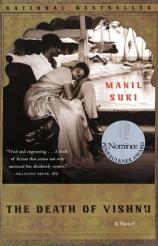Reading Group Guide
Discussion Questions
The Death of Vishnu: A Novel

1. What was actually happening during Vishnu's out-of-body experience in the stairwell? Was this the dream of a dying man, informed by his experiences in life, or was it an authentic transition away from his body, in line with the Hindu concept of death? What evidence is there of either position?
2. As the only Muslim residents, the Jalal's are outsiders in the building, and are occasionally referred to with suspicion by the rest of the building and the neighborhood. They are also the most religiously fervent-demonstrated in Mrs. Jalal's piety and wish for her family to join her in religious observance, and in Mr. Jalal's enthusiastic conversion to a spiritual life. Is there a relationship between isolation and spirituality being drawn?
3. How are the Asranis and Pathaks different in this respect? Is their membership in the dominant Hindu culture the cause of their very different relationship to religion? Or, is that an unfair assessment of middle-class families struggling to do what they feel is right?
4. What resemblance does The Death of Vishnu bear to the works of other Indian authors you've read? How is it different? For instance, does it contain the qualities of "magical realism" found in Salman Rushdie's books?
5. Who is Padmini to Vishnu? Despite his unfailing devotion to her, he still laughs heartily at the absurdity of his own romantic fantasies when they steal the Jalal's car and drive to Lonavala. Was it physical attraction that kept him coming to her, or something else? Why was she so appealing to him right up until she disappeared from his life, even after he was overwhelmed by the absurdity of it all?
6. Why is Mr. Jalal obsessed with experiencing faith? The power of his yearning is stronger than the intellectual pursuits that drove his prior life, even leading him to acts of violence upon himself. Did his "awakening" represent an authentic change for him, or was his previous adherence to the doctrine of reason an equally faith-based position?
7. Why does Mr. Taneja mourn the loss of his wife for so many years? Do you think he should have given greater consideration to the marriage proposal he received while working for the social agency? He often seems to be above the anxieties of the other families in the building-is this because of his financial comfort, or his lack of a family to worry about, or simply his personality?
8. Kavita's final "performance" for the police investigator paints an unflattering, self-absorbed picture of her, one which is in line with the petty hostilities displayed between the Asranis and Pathaks throughout the novel. However she also does appear to have genuine sympathy for Vishnu-in fact she probably called upon those feelings in order to render her final performance more authentic. What criticism is being made of these rivaling families throughout the novel?
9. Does the conclusion of the novel give you the impression that it took place in a Hindu universe, or was the scene in the forest another aspect of Vishnu's dream? Is it a Hindu world, or is the recurrent Hindu mythology a mere vehicle for understanding the culture that the characters live within? Given that all of the action involving Vishnu takes place within a flashback, is it possible that the entire novel is his dream? Is he perhaps, like the god Vishnu, supporting the universe, by imagining it?
The Death of Vishnu: A Novel
- Publication Date: January 1, 2002
- Genres: Fiction
- Paperback: 304 pages
- Publisher: Harper Perennial
- ISBN-10: 006000438X
- ISBN-13: 9780060004385







